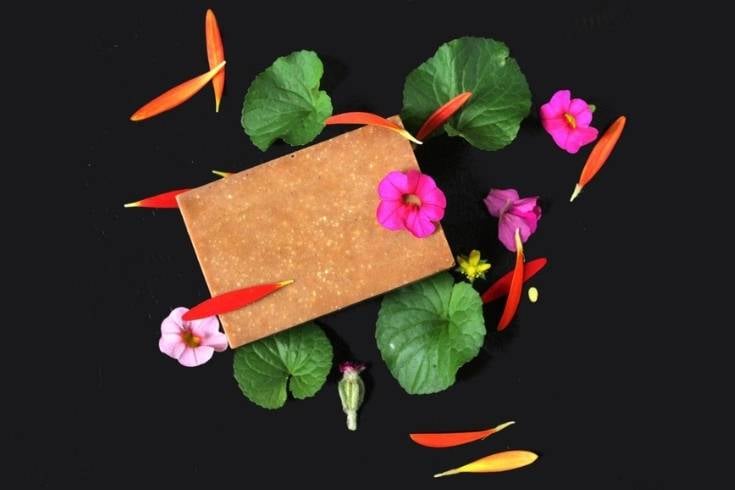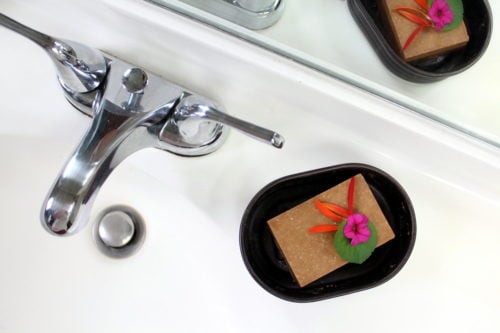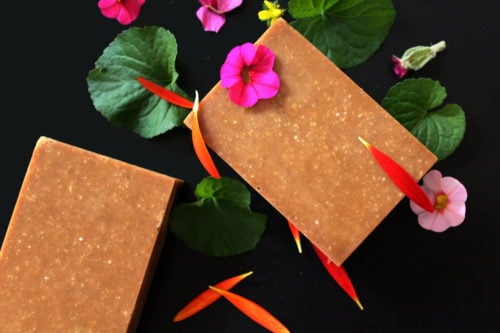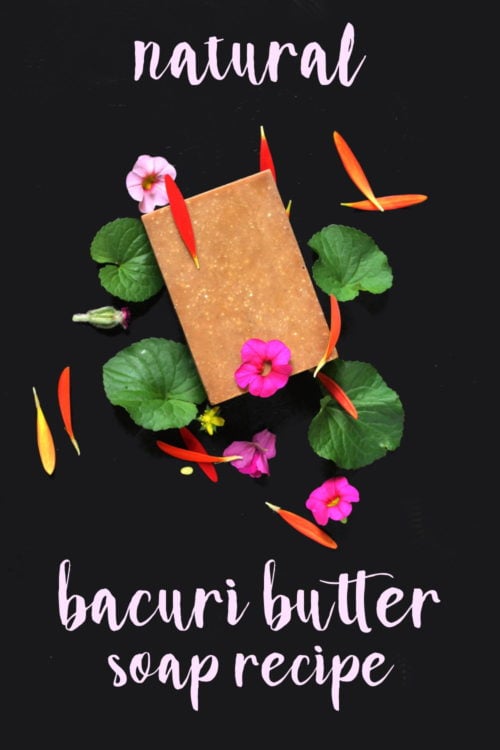
Exotic Natural Bacuri Butter & Murumuru Soap Recipe
This natural bacuri butter & murumuru soap recipe is the perfect soapmaking project for exploring new ways to use exotic ingredients in natural skin care recipes. Left unscented to allow the warm, natural earthy scent of bacuri butter to shine through, this handmade soap recipe is another must for your recipe file!

Murumuru Soap
I am a soap addict. It’s true. Ever since I tried my first Zum soap bar back in college I’ve been hooked on handmade cold process soaps. In fact, that’s kind of the reason I started making my own. Later down the road, when Etsy first arrived as a marketplace for handmade and vintage items way back in 1995, it was like a whole new world had opened up to me. Not only was I able to purchase handmade soaps from emerging artisans, it also led to me to eventually sell my own handmade soaps.
I no longer sell any of the handmade soaps or skin care products I create. Mostly because I love crafting, formulating, writing, wizardry and magic SO much more than retail sales. That doesn’t stop me from making my own handmade soaps though. It’s just that these days I never have to make the same soap twice. And all of my soapmaking formulations are completely different from the one prior.
Of course, I still shop on Etsy to this day. (Wait? That’s how many years later?) And, as is the way of a self confessed soap addict’s life, I still buy other people’s handmade soap.
Luckily my soap addiction stops at the production, purchase and use of handmade soaps. I’ve read, that apparently, some people are actually addicted to eating soap. That is an entirely other bag of tricks that I (thankfully) know nothing about. (And ew. Gross.)
Anyhow, I’m pretty excited about sharing my latest handmade soap recipe with you. My handmade bacuri butter & murumuru soap recipe is made using one of my newest favorite ingredients, bacuri butter. (As the name implies.) However, it also contains a new butter that I’ve recently started experimenting with called murumuru butter.

What is Murumuru Butter?
Like bacuri butter, murumuru butter is a sustainable product from the Brazilian Amazon Forest. It is cold pressed from the reddish-orange fruits of the Astrocaryum murumuru tree, a tall palm tree native to Brazil.
Murumuru butter has a similar melting point when compared to cocoa butter. It melts at 91.4°F, while cocoa butter melts at a slightly higher temperature between 93°F and 101°F. So an easy way to start experimenting with this natural butter, would be by replacing it for the cocoa butter in your existing recipes. In addition, murumuru can also be used in the place of some of the cocoa butter in chocolate recipes to give it a firmer consistency.
Most similar in composition to coconut oil, murumuru butter contains the same amount of lauric acid. However, unlike coconut oil, murumuru butter won’t clog your pores. A highly nourishing emollient and moisturizer, murumuru butter is also rich in vitamins A and C as well as Omega 3 & 6. Additionally, it also contains high percentages of lauric, myristic and oleic acid. These physical properties make murumuru butter particularly suited for skin care recipes that promote skin health or are used to remedy dry skin.
Due to murumuru butter’s unique composition of essential fatty acids and Pro-Vitamin A, it makes a lovely natural option for your anti-aging skin care recipes and products. These components have been shown to help restore elasticity to damaged and aging skin as well as promote healing. As such, murumuru butter makes a wonderful addition to homemade moisturizers meant to soothe eczema, psoriasis or dry and cracked skin as well as anti-aging creams and butters.
Murumuru butter is an incredibly versatile ingredient. Therefore it’s no surprise that it’s found in such a wide range of skin care and beauty products. The most common applications for murumuru butter are as part of the formulations for lotions, soaps, hair conditioners, facial masks, shampoo, oils and emulsions, skin moisturizers, depilatory waxes, lipsticks and deodorants. Also, like bacuri butter, murumuru butter can be an effective remedy against acne due to its antiseptic, anti-allergenic, antibacterial, antiviral and anti-inflammatory skin care properties.
Bacuri Butter & Murumuru Soap Recipe
My bacuri butter & murumuru soap recipe creates a hard, long lasting soap bar with a stable lather. It’s formulated to cleanse and balance skin without overdrying, as is the case with many commercial soaps, as well as lend some skin conditioning properties. Left unscented, this natural handmade soap recipe reflects the natural, warm and earthy fragrance of bacuri butter with a milder aroma.

Bacuri Butter & Murumuru Soap Recipe
Ingredients:
1.6 oz. bacuri butter (10%)
1.6 oz. murumuru butter (10%)
1.6 oz. avocado oil (10%)
1.6 oz. castor oil (10%)
2.4 oz. coconut oil (15%)
7.2 oz. pomace olive oil (45%)
4.8 fl. oz. distilled water (30.5% discount)
2.2 oz. lye/sodium hydroxide (6% superfat)
1 Tablespoon red Rhassoul clay
1 Tablespoon pink Himalayan salt (or sea salt)
What You Need to Know to Make Cold Process Soap
You will need a digital scale and a silicone soap mold for my bacuri butter & murumuru soap recipe. As I make a lot of soap, I use this heavy duty Baker’s Math scale. I also used this rectangle silicone soap mold for this particular handmade soap recipe. In addition you’ll also need all other required supplies for making cold process soap from scratch. These materials include a digital thermometer and an immersion blender as well as aluminum free, heat safe containers and utensils.
If you have never made cold process soap before, you should read my cold process soapmaking tutorial before you begin. I also recommend starting with a simpler, beginner’s soap recipe with less expensive ingredients for your first try as soapmaking mistakes do happen.
How to Make Murumuru Soap with Bacuri Butter
Begin by preparing the lye solution for my natural bacuri butter & murumuru soap recipe. To do this, measure out the distilled water into a heat safe container. In a separate container, weigh out the lye called for in the recipe. Now pour the lye into the water – I recommend a well ventilated area – and mix until the lye has completely dissolved. Set the lye-water solution aside in a safe location to cool.
While the lye solution cools, weigh out the carrier oils, bacuri and murumuru butters called for in my bacuri butter & murumuru soap recipe. Combine your soapmaking fats in a stainless steel pot. Then gently heat the soapmaking oils on the stove over low heat just until the solids have melted.
Remove the soapmaking oils from heat and allow to cool.
Once the oils and the lye-water have reached 90°-95°F you are ready to make soap.

Check the temperature of both the soapmaking oils and the lye solution before you begin. Both of these ingredients should be within ten degrees of one another.
Using a measuring spoon, measure out one Tablespoon spoon each of both the Rhassoul clay and the salt. (You do NOT want to use Dead Sea salt.) Mix into the melted soapmaking oils and butters using an immersion blender. Once the clay and salt are fully incorporated throughout the soapmaking fats, you can add the lye-water.
Carefully pour the lye-water solution into the soapmaking oils and mix with the immersion blender until you reach trace. You’ll know you’ve reached trace when you drag the blender through the soap batter and it leaves a visible trail behind. It’s a little like pudding.
Now pour the soap evenly into the cavities of your silicone soap mold. Gently cover the soap with plastic wrap or parchment paper and set aside in a safe location where it won’t be disturbed.
You should be able to unmold your natural bacuri butter & murumuru soaps the next day. Simply turn them out of the mold cavities, then allow your soap to cure for four to six weeks in a cool, dry location. After that, your handmade soaps are ready to use.
If you like my natural bacuri butter & murumuru soap recipe, then be sure to try my other bacuri butter skin care recipes. These recipes include my 3-ingredient bacuri butter body butter recipe and my anti-aging bacuri butter body balm recipe. Alternately, you can find a complete listing of all of my cold process soap recipes from over the years here.
For more great projects like my bacuri butter & murumuru soap recipe, be sure to follow Soap Deli News on Pinterest, Facebook, Twitter and Instagram. Alternately, you can subscribe to Soap Deli News via email for future updates, DIY projects and recipes.



